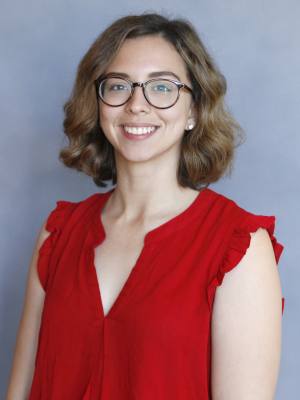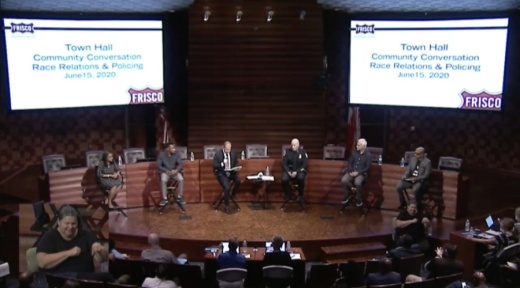But the city made a step toward progress, he said, at a June 15 town hall on race relations and policing that brought city, community, school district and religious leaders together.
“I hope everyone goes away from this evening thinking of tonight as the starting line,” Cheney said at the end of the town hall.
Gathering the community
Community response is one of the first steps towards initiating change in Frisco, said Daniel Rentie, an organizer of the city’s first peaceful protest that promoted racial equity and the banning of police brutality.
Rentie said a statement was made by Frisco when over 4,000 people showed up to the protest June 1.
“This is the way we can really go about change,” Rentie said at the town hall. “It’s being willing to have those uncomfortable conversations with each other, being able to walk alongside each other and do things together. These are the ways we can go about real, practical solutions and put them into action.”
Every community member in Frisco has a different role in promoting more diversity and inclusion, Rentie said.
“We have so many resources in this influential city,” he said. “We have the best, top-notch education; we have the best of the best in so many different things. And I feel like if anyone can figure this problem out, it would be a city like Frisco, Texas.”
City and school inclusion
The city made efforts in incorporating more minority voices last year through the Mayoral ad-hoc Frisco Inclusion Committee, Cheney said. The committee partners with city leaders and underrepresented communities to foster cultural dialogue and find solutions for Frisco’s diverse populations.
Committee member and panelist Sunitha Cheruvu said the committee has served as an “invaluable” resource to her during the COVID-19 pandemic and protests.
“Not only do I get to converse with my friends and learn about some of their challenges in the black and African American communities, but I also relate to it as someone of color,” Cheruvu said. “We were able to share stories and get that deeper understanding.”
The inclusion committee serves as a connector between city leadership and Frisco’s communities of color, Cheruvu said.
Educating Frisco’s children on racism and diversity is another important step toward progress, Rentie said.
“A lot of black children in the education systems in Frisco, Texas, can say that they have a real story with racism, and not just a small conversation, but a traumatic experience with racism,” said Rentie, a Wakeland High School alum.
At the town hall, Frisco ISD Superintendent Mike Waldrip said the district is working on several initiatives to tackle diversity issues in training, education and hiring. One way the district does this is through its diversity task force, he said.
“Over the last seven years, we’ve increased minority representation at the central office level, the very highest level of administration, by 18%, which is phenomenal,” Waldrip said.
Additionally, Waldrip said the school district’s diversity training touches on topics such as implicit bias.
Changing mindsets
Reshaping the view of Frisco’s communities of color is a part of increasing inclusion in the city, according to a few panelists.
Recognizing white privilege has been a topic of frequent discussion at Preston Trail Community Church in Frisco, said Senior Pastor Jim Johnson, and it has been necessary for members to see the disadvantages often faced by people of color.
“Those are the things that more and more of our people are beginning to come to grips with,” Johnson said. “And I’m really grateful for it.”
Part of changing negative perceptions of Frisco’s black residents by non-black residents will come from progressive collaboration between the Frisco Police Department and the black community, said Charles Brazil Jr., a panelist and local real estate business owner.
“If we can be a role model, a leader, from a city perspective throughout the state of Texas, throughout the country, then that’s what I would hope for us to do,” he said.





